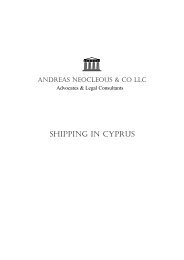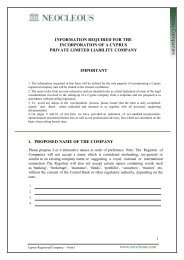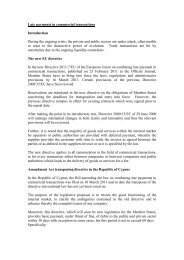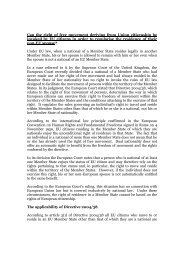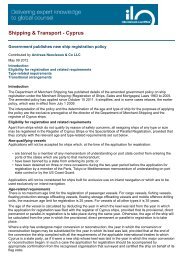Cyprus - Andreas Neocleous & Co
Cyprus - Andreas Neocleous & Co
Cyprus - Andreas Neocleous & Co
You also want an ePaper? Increase the reach of your titles
YUMPU automatically turns print PDFs into web optimized ePapers that Google loves.
CYPRUS<br />
CYP/21<br />
Part IV of the Regulation of Relations Law makes provision for the execution<br />
and expiration of the commercial agency agreement. It imposes an obligation on<br />
both parties to contract and sign a written agreement which determines the terms<br />
of the commercial agency agreement and any other subsequent terms which are<br />
to be agreed.<br />
It is important to note that the Regulation of Relations Law will govern<br />
commercial agency agreements which were not in writing and which were<br />
agreed before the Regulation of Relations Law came into force.<br />
The following will determine whether the contract between principal and agent<br />
will fall within the ambit of the Regulation of Relations Law:<br />
• The <strong>Co</strong>ntract Law and the principles of common law will apply to an<br />
agreement made in writing prior to July 1992;<br />
• All of the provisions of the Regulation of Relations Law will apply to an<br />
agreement made prior to July 1992 but not in writing; and<br />
• The Regulation of Relations Law will apply to a written agreement made<br />
after 1992.<br />
Where the parties continue to implement a fixed-term commercial agency<br />
agreement after its expiration, this is considered as becoming a commercial<br />
agency agreement of an indefinite duration.<br />
If a commercial agency agreement is for an indefinite period, any party may<br />
terminate it on account of the failure of the other party to perform all or any of<br />
its obligations, by giving a written notice. The period of this notice must be the<br />
same for both parties and is specified in the Regulation of Relations Law as<br />
being one month for the first year of the agreement, two months for the second<br />
year, three months for the third year, four months for the fourth year, five<br />
months for the fifth year and six months for the sixth and subsequent years.<br />
When calculating the above period of notice for repudiation, any previous fixed<br />
term is also taken into account. It is not possible for the parties to agree to a<br />
shorter period for notice of termination, but the parties can agree longer periods<br />
for notice of termination provided the notice to be given to the principal is not<br />
shorter than that to be given to the commercial agent. Unless the parties have<br />
agreed differently, the notice period must expire at the end of a calendar month.<br />
There have been no reported cases concerning the Regulation of Relations Law.<br />
However, because it incorporates verbatim the text of the 1986 EEC Directive,<br />
any interpretation given by the European <strong>Co</strong>urt of Justice may be relied on as<br />
useful guidance.<br />
Where the Regulation of Relations Law is inapplicable (for example, because of<br />
its narrow definition section), the courts will apply the <strong>Co</strong>ntract Law and the<br />
principles of common law to determine what would constitute a 'reasonable<br />
period of notice'. In applying these principles a judge would, of course, exercise<br />
his discretion and much will depend on how he views the merits of the case as a<br />
whole.<br />
(Release 2 – 2013)




